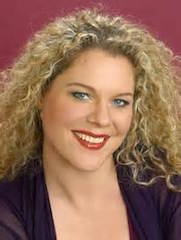
CSO Season Finale Features "Sheherazade"

Michelle DeYoung
|
Brilliant music making.
And that’s the way it was Saturday night at Music Hall with
the Cincinnati Symphony Orchestra’s performance of “Sheherazade” by Nicolai
Rimsky-Korsakov.
It was the final concert of the orchestra’s
2014-2015 subscription season.
Led by music director Louis Langrée, this “Sheherazade” blazed with color (and reached 107 decibels by a concert companion’s count).
Also on the program, which had an “Arabian Nights” theme, was Maurice Ravel’s “Shéhérazade” in a sensitive interpretation by mezzo-soprano Michelle DeYoung (a last-minute substitution for previously announced percussionist Martin Grubinger, who was forced to withdraw because of illnes
DeYoung delivered Ravel’s songs in a sumptuous voice that was never forced. “Asie” (“Asia”) was fully exotic with its web of fairy tale images, turning dark at one point as the singer evokes “murderers smiling at the executioner who cuts off an innocent head with his great curved oriental sword.”
The second song, “La Flûte Enchantée” (“The Enchanted Flute”) featured associate principal flutist Henrik Heide in a lovely exchange with DeYoung about a woman listening to her lover play the flute. The final song, “L’Indifférent” (“The Indifferent One”) was distant indeed, as DeYoung sang dispassionately about a mysterious youth who passes by indifferent to a woman who beckons to him.
Rimsky-Korsakov’s masterpiece “Sheherazade” burst with instrumental color. Rimsky was one of the greatest of all orchestrators, masterful in his use of solo instruments across the musical palette. Virtually every member of the CSO had the chance to shine here in one way or another.
Central to the score was concertmaster Timothy Lees’ exposition of the Sheherazade theme, which took on a vivid personality in his hands and made an eloquent statement at each recurrence. Making outstanding contributions throughout were principal cellist Ilya Finkelshteyn and principals William Winstead (bassoon), Dwight Parry (oboe), Jonathan Gunn (clarinet), Randolph Bowman (flute) and Elizabeth Freimuth (French horn).
“The Sea and Sinbad’s Ship” conveyed the grandeur of the sea with its undulating cellos, and the march episode in “The Tale of Prince Kalendar” crackled. “The Young Prince and the Princess” was dreamy and nostalgic, while the final movement, “The Festival at Baghdad,” opened with a dramatic statement by the full orchestra. The big climax, capped by trombones, reached into every crevice of Music Hall (with those decibels previously mentioned). Lees brought the work to its conclusion with a harmonic high in the violin’s stratosphere.
The concert opened with another well-loved Russian score, the “Polovtsian Dances” from “Prince Igor” by Alexander Borodin. Parry sounded the opening theme with deep feeling (“Stranger in Paradise,” well known from the Broadway musical “Kismet”). Percussionist Mark Wolfley hefted the bass drum in the dance of the warriors and there was a virtual whirlwind of sound at the end.
Recognized following intermission and presented with photographs of the orchestra signed by all of its members were first violinist Sylvia Samis and second violinist Harold Byers, both retiring from the CSO this season.